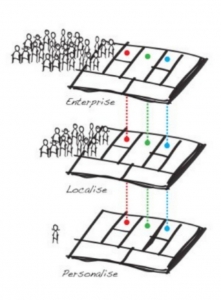Business modeling typically focuses on designing and testing new services or products to answer a crucial, ongoing question: How can the enterprise revise or reinvent its strategy for greater marketplace success? In short, business modeling deals mainly with external customers. 
The external customer focus makes perfect sense. But most established organizations devote fewer resources to business model design and testing and far more resources to business model execution.
This execution is handled mainly by employees, all of who ultimately owe their livelihoods to external customers. Yet many employees — especially those working in areas such as accounting, IT, human resources, administration, finance, logistics, or research — have little or no direct contact with external customers. How, then, can such employees best understand to whom they ultimately deliver value?
By grasping the enterprise business model.
That’s why we’re convinced all employees should undergo basic business model training. And we’re convinced such training should cover both the enterprise model and the employee’s role in its execution.
An employee’s role in executing an enterprise model is defined by a personal business model. So once a valid enterprise model is ready to execute, the focus naturally shifts toward ordinary employees — the rest of us.
If we see organizations as living systems rather than mere economic machines, we recognize that employees deserve opportunities to develop their talents and pursue their aspirations while executing the enterprise model. 
Personal business models are in that sense fractals of the enterprise model. We might say that the shift from business model design and testing to business model execution results in a parallel shift in focus from the external to the internal environment.
Such an external-to-internal shift is being recognized by more and more community members, who are eager to adopt personal business modeling techniques in teams, workgroups, divisions, or across the enterprise. So in future posts, we’ll focus more on using personal business modeling techniques in teams and other enterprise units.
In the meantime, listen to what Sushma Panikker, senior manager of learning and development for the 4,000+ employee Emaar Hospitality Group, has to say about business model training in this new video.



